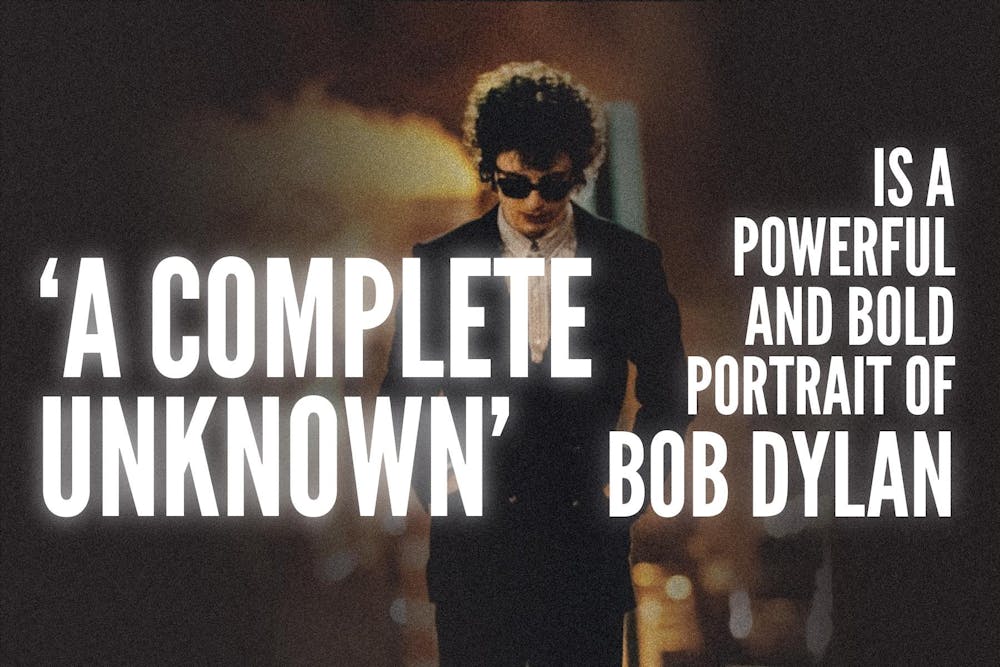Music biopics have been facing increasing derision recently as many people have grown tired of their supposed generic structures and cliché story beats. And then you have some cinephiles who smugly claim the satirical “Walk Hard: The Dewey Cox Story” killed the genre and that any attempt at a music biopic is now a fool's errand. Nevertheless, I still enjoy the music biopic and believe it is a compelling format to recapitulate a musician's career. So enter “A Complete Unknown,” a biopic about Bob Dylan directed by James Mangold and starring Timothée Chalamet. Mangold was once hailed as among the most reliable journeymen in Hollywood before directing the putrid “Indiana Jones and the Dial of Destiny.” Despite that blunder, I still think he is a good director, so I've been excited to see how he would try to reinvigorate the biopic genre with this film. I’m also a big Bob Dylan fan, so I hoped the film would inspire young people to get into Dylan's music more. And while I think Chalamet’s excellent performance and the deft presentation of his songs sufficiently accomplish that, the film is also a much more daring and unflattering portrayal of Dylan as a person than I thought it would be. But this equally awe-inspiring and damning examination of its central subject is what ultimately makes it a truly great biopic.
“A Complete Unknown” subverts many clichés of the biopic genre. Instead of doing a cradle-to-grave approach to Bob Dylan’s life, it only focuses on the first four years of his career, from his arrival in New York in 1961 to his infamous Newport Folk Festival performance in 1965. Additionally, the film eschews the conventional biopic approach: facile deconstruction of the central subject’s motivations and goals. The film wisely understands that Bob Dylan defies such characterization and instead leans into painting him as the impenetrable enigma he truly was. From the moment he reaches New York, you get the sense of reality warping around him. He’s like a somnambulist being possessed by otherworldly talent, a talent that is a mystery to both himself and others. The film is all about the world’s futile efforts to get a hold of Dylan and the freewheeling artistry that took him wherever it wanted.
Mangold deftly accomplishes this focus on the world’s relationship with Dylan through his filming of the film’s musical performances. These sequences are less about Dylan and more about the impact his music had on the people around him. The film frequently cuts to others reacting to his eloquent and moving songs. This simple tactic succeeds because of the excellent performances from the supporting cast of Elle Fanning, Edward Norton and Monica Barbaro. They’re able to capture so many emotions and thoughts with their facial expressions, revealing the many different ways Dylan's music impacted people. By emphasizing reaction shots, Mangold invites the audience to also become swept up in their emotions. The film creates a thick atmosphere around Dylan's performances that really sells to modern audiences how revolutionary and captivating of an artist he was.
The final Newport Folk Festival scene is where the film’s thematic richness fully crystallizes and illustrates how Dylan's artistry was untamable and isolating. He has an insatiable desire to subvert, rendering him incapable of maintaining relationships. By the end of the Newport Festival, he loses his friendships with Pete Seeger, Joan Baez and Sylvie Russo because his artistic antics have deeply hurt and betrayed them. And even after he achieves his goal of playing rock and roll music at the festival, reclaiming his artistic agency and causing ample outrage, he still seems melancholic and unfulfilled. It’s never enough for him. Just as quickly as he conquered folk music, he became bored with it. All the people’s lives he inspired with his folk music or the social change he called for in his own songs meant nothing to him. Dylan views people as mere targets of provocation. It’s a callous worldview solely focused on satiating his ever-evolving artistry that prevents him from having lasting fulfillment and relationships with others; it's also what makes him so brilliant and talented. It’s a boldly bittersweet and challenging conclusion about Bob Dylan that steers clear of simple hagiography.
Chalamet is exceptional as Bob Dylan. By the time he finishes singing “Song to Woody” in the film’s opening minutes, you forget you’re watching an impersonation. He fully inhabits Dylan’s cryptic nature and awkward charm. And his musical performances are shockingly fantastic; his imitation of Dylan’s unique singing style feels very natural. I also especially loved Norton’s performance as Pete Seeger. His palpable earnestness and tender adoration of Dylan provide much of the emotional weight of the final act as Norton strongly captures the devastation Seeger felt from Dylan’s betrayal of the folk movement.
“A Complete Unknown” will likely leave audiences more perplexed about Bob Dylan than they were before viewing the film; it might even leave them with a negative perception of him as a person. But that's also what makes it such an excellent film. It compellingly presents his brilliant music with the help of an impressive performance by Chalamet while still honoring his enigmatic persona. He was an epochal yet transcendent figure whose artistry endlessly inspired and hurt the people who cared about him. Thus, Mangold has proved the music biopic is not dead; any film that can communicate such multitudes about its subject matter is a triumph.










